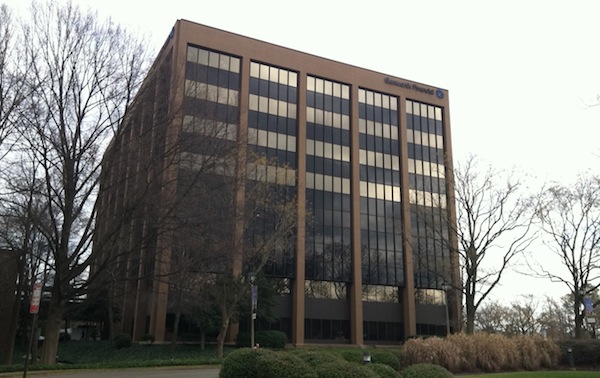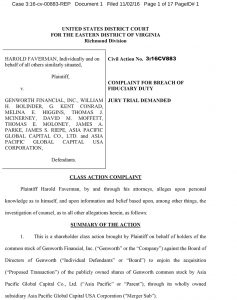A local Fortune 500 company’s deal to be acquired and taken private by a Chinese conglomerate has caught the ire of at least one disgruntled investor.
The members of the board of directors of Henrico-based insurance giant Genworth Financial were sued last week in Richmond federal court by shareholder Harold Faverman, who is seeking class action status to either block the company’s pending $2.7 billion deal to be acquired by China Oceanwide or win damages should the transaction be completed.
Filed Nov. 2, Faverman’s case states it was initiated on behalf of all Genworth shareholders and alleges breaches of fiduciary duty against company directors. It argues that the deal won’t result in the best value for Genworth shareholders based on the per-share offer and provisions preventing the company from pursuing other suitors.
“The proposed transaction was the result of a flawed process and is woefully inadequate in light of Genworth’s true value and its growth prospects,” the lawsuit argues.
The defendants in the case include Genworth directors William Bolinder, G. Kent Conrad, Melina Higgins, David Moffett, Thomas Maloney, James Parke, James Riepe, and Genworth CEO Thomas McInerney.
A Genworth spokesperson said Wednesday the company doesn’t comment on litigation.
The suit argues that China Oceanwide’s offer to pay $5.43 in cash per share for Genworth common stock is only a 4.2 percent premium on the $5.21 per share closing price the last trading day before the deal was announced.
It argues that the company has been on a recent uptick, citing Genworth’s stock price had risen 22 percent since the beginning of 2016, when it bottomed out in February at $1.61.
It also claims the company’s growth prospects can be seen in “earnings surprises in each of its recent quarters,” referring to the company’s performance exceeding analysts’ expectations in the first two quarters of 2016.
However the company did announce last month that it faces charges of up to $625 million to add more reserves for its long-term care coffers. That led to a loss of $380 million in the third quarter, the company announced last week.
The case further alleges that “preclusive deal protection measures,” are preventing the company from freely shopping around for better offers. It cites provisions in the deal such as a non-solicitation clause that prohibits Genworth from seeking other suitors while the deal is still pending, and a $105 million termination fee if Genworth decides to back out of the deal.
Many of those sorts of provisions are standard in large corporate M&A deals.
The suit doesn’t say how many public shareholders exist, but there are 498 million shares outstanding.
Headquartered on West Broad Street, Genworth is known for its mortgage, life and long-term care insurance operations. It has been hit hard in the last few years by miscalculations on the costs of its long-term care reserves.
Upon announcing the China Oceanwide deal last month, the company said it was the best alternative for shareholders in the face of those challenges. In addition to paying $5.43 per share, China Oceanwide plans to kick in $1 billion in cash to help shore up Genworth’s life insurance business and handle debt that’s due in 2018.
Other defendants in the Faverman case are Asia Pacific Global Capital Co. and Asia Pacific Global Capital USA Corp., entities used by China Oceanwide in the acquisition. The suit claims the Asia Pacific firms aided and abetted the Genworth’s board of directors in their alleged breaches of fiduciary duty.
Faverman is represented by law firm Finkelstein Thompson in Washington, D.C. The lead attorney on the case did not respond to an inquiry by press time.
Faverman’s attorneys ask for a jury trial and for the court to certify the case as a class action suit. They seek to either block the deal outright or put it on hold until its terms could be amended. It also seeks an unspecified amount of damages for Genworth shareholders.
The nature of Faverman’s lawsuit is similar to those that have become commonplace in the wake of pending mergers and acquisitions involving public companies. And the suit comes on the heels of efforts from securities law firms around the country that, immediately following the announcement of the China Oceanwide deal, put out the word they were “investigating” the proposed acquisition and seeking Genworth shareholders to sign on as lead plaintiffs.
The practice has become some common that many companies plan for and include the related legal expenses in their budgets and deal calculations.
When lawsuits do result, they often look to block the deals, force changes in the terms or extract damages. Such suits are often settled, dropped altogether or can lead to changes in the language of the proposed transactions.
The practice has affected several Richmond deals, both large and small, in recent years.
And the name Harold Faverman is also no stranger to class action lawsuits.
Men with that name have been the lead plaintiff in at least two other shareholder class action lawsuits, court and SEC records show. One case involved Puerto Rican financial firm Doral Financial Corp. in 2005 and the second was a securities fraud case alleged against energy data firm Seitel Inc. in 2002.
It could not be determined if those plaintiffs were the same Harold Faverman involved in this latest Genworth case.
A local Fortune 500 company’s deal to be acquired and taken private by a Chinese conglomerate has caught the ire of at least one disgruntled investor.
The members of the board of directors of Henrico-based insurance giant Genworth Financial were sued last week in Richmond federal court by shareholder Harold Faverman, who is seeking class action status to either block the company’s pending $2.7 billion deal to be acquired by China Oceanwide or win damages should the transaction be completed.
Filed Nov. 2, Faverman’s case states it was initiated on behalf of all Genworth shareholders and alleges breaches of fiduciary duty against company directors. It argues that the deal won’t result in the best value for Genworth shareholders based on the per-share offer and provisions preventing the company from pursuing other suitors.
“The proposed transaction was the result of a flawed process and is woefully inadequate in light of Genworth’s true value and its growth prospects,” the lawsuit argues.
The defendants in the case include Genworth directors William Bolinder, G. Kent Conrad, Melina Higgins, David Moffett, Thomas Maloney, James Parke, James Riepe, and Genworth CEO Thomas McInerney.
A Genworth spokesperson said Wednesday the company doesn’t comment on litigation.
The suit argues that China Oceanwide’s offer to pay $5.43 in cash per share for Genworth common stock is only a 4.2 percent premium on the $5.21 per share closing price the last trading day before the deal was announced.
It argues that the company has been on a recent uptick, citing Genworth’s stock price had risen 22 percent since the beginning of 2016, when it bottomed out in February at $1.61.
It also claims the company’s growth prospects can be seen in “earnings surprises in each of its recent quarters,” referring to the company’s performance exceeding analysts’ expectations in the first two quarters of 2016.
However the company did announce last month that it faces charges of up to $625 million to add more reserves for its long-term care coffers. That led to a loss of $380 million in the third quarter, the company announced last week.
The case further alleges that “preclusive deal protection measures,” are preventing the company from freely shopping around for better offers. It cites provisions in the deal such as a non-solicitation clause that prohibits Genworth from seeking other suitors while the deal is still pending, and a $105 million termination fee if Genworth decides to back out of the deal.
Many of those sorts of provisions are standard in large corporate M&A deals.
The suit doesn’t say how many public shareholders exist, but there are 498 million shares outstanding.
Headquartered on West Broad Street, Genworth is known for its mortgage, life and long-term care insurance operations. It has been hit hard in the last few years by miscalculations on the costs of its long-term care reserves.
Upon announcing the China Oceanwide deal last month, the company said it was the best alternative for shareholders in the face of those challenges. In addition to paying $5.43 per share, China Oceanwide plans to kick in $1 billion in cash to help shore up Genworth’s life insurance business and handle debt that’s due in 2018.
Other defendants in the Faverman case are Asia Pacific Global Capital Co. and Asia Pacific Global Capital USA Corp., entities used by China Oceanwide in the acquisition. The suit claims the Asia Pacific firms aided and abetted the Genworth’s board of directors in their alleged breaches of fiduciary duty.
Faverman is represented by law firm Finkelstein Thompson in Washington, D.C. The lead attorney on the case did not respond to an inquiry by press time.
Faverman’s attorneys ask for a jury trial and for the court to certify the case as a class action suit. They seek to either block the deal outright or put it on hold until its terms could be amended. It also seeks an unspecified amount of damages for Genworth shareholders.
The nature of Faverman’s lawsuit is similar to those that have become commonplace in the wake of pending mergers and acquisitions involving public companies. And the suit comes on the heels of efforts from securities law firms around the country that, immediately following the announcement of the China Oceanwide deal, put out the word they were “investigating” the proposed acquisition and seeking Genworth shareholders to sign on as lead plaintiffs.
The practice has become some common that many companies plan for and include the related legal expenses in their budgets and deal calculations.
When lawsuits do result, they often look to block the deals, force changes in the terms or extract damages. Such suits are often settled, dropped altogether or can lead to changes in the language of the proposed transactions.
The practice has affected several Richmond deals, both large and small, in recent years.
And the name Harold Faverman is also no stranger to class action lawsuits.
Men with that name have been the lead plaintiff in at least two other shareholder class action lawsuits, court and SEC records show. One case involved Puerto Rican financial firm Doral Financial Corp. in 2005 and the second was a securities fraud case alleged against energy data firm Seitel Inc. in 2002.
It could not be determined if those plaintiffs were the same Harold Faverman involved in this latest Genworth case.

